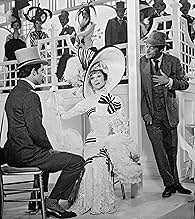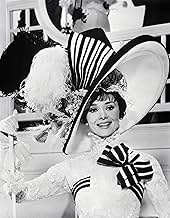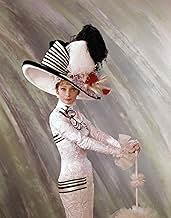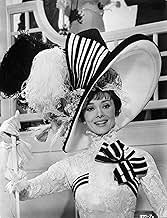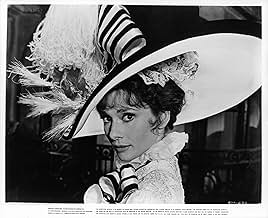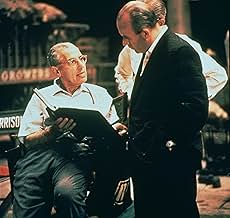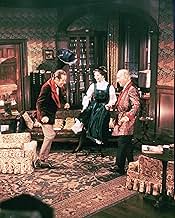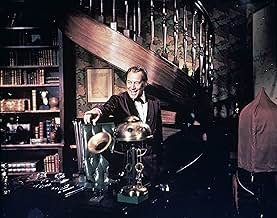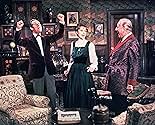Un profesor de élite de fonética acepta la apuesta de que puede transformar a una florista y hacerla presentable para la alta sociedad.Un profesor de élite de fonética acepta la apuesta de que puede transformar a una florista y hacerla presentable para la alta sociedad.Un profesor de élite de fonética acepta la apuesta de que puede transformar a una florista y hacerla presentable para la alta sociedad.
- Dirección
- Guionistas
- Elenco
- Ganó 8 premios Óscar
- 26 premios ganados y 13 nominaciones en total
David Ahdar
- Ball Guest
- (sin créditos)
- …
Elizabeth Aimers
- Cockney
- (sin créditos)
Helen Albrecht
- Ascot Extra
- (sin créditos)
John Alderson
- Jamie - Doolittle's crony
- (sin créditos)
Mary Alexander
- Cockney
- (sin créditos)
Gertrude Astor
- Cockney
- (sin créditos)
LaWana Backer
- Ad Lib at Church
- (sin créditos)
Walter Bacon
- Ball Guest
- (sin créditos)
Opiniones destacadas
My Fair Lady is a musical which is very witty. The dialogue is wonderful. The story begins as Henry Higgins (Rex Harrison) makes a bet that he can transform flower girl Eliza Dolittle (Audrey Hepburn) into a high society lady. Henry Higgins is the perfect example of high society snobbery of the times. What he wasn't counting on was falling in love with his "project". Some people may find this film to be sexist but it is really quite the opposite. While it is about a sexist person it is not actually sexist at all. In fact it is all about the irony in the relationship between that of Eliza Dolittle and Henry Higgins. It is not unbelievable that Henry and Eliza should fall in love because they are not "compatible". Opposites often attract after all. Even though there is an anti-romantic disclaimer in the original play Pygmalion , it is obvious that Eliza and Higgins are meant for one another in the end of My Fair Lady. My Fair Lady is really different from Pygmalion. There is a movie version of Pygmalion which is the dull non-musical version of My Fair Lady. Rex Harrison is simply wonderful as Henry Higgins. He is not one bit tired with his role. And even though Julie Andrews originated the role of Eliza on Broadway, Audrey Hepburn is great in the role. It would be unfair to say that she didn't deserve the role just because her voice was dubbed. The supporting cast is first rate as well. This film is more than just good, it is great. If you have not seen it yet you certainly should!
*****/ ***** stars
*****/ ***** stars
I've seen MY FAIR LADY several times. However, it wasn't until last night that I finally saw the 1938 version of PYGMALION and this was very interesting indeed. It seems that MY FAIR LADY is actually NOT based on the George Bernard Shaw play as much as it's based on the Leslie Howard movie. That's because the dialog (particularly Henry Higgins') is often word-for-word that of the film. Additionally, both films have the same ending--one that is NOT the same as the original play. In the play, the ending was more sad but also much more realistic and consistent with the characters and their growth (or lack thereof in the case of Henry Higgins).
Quality-wise, both films are superb and I enjoyed them immensely. One very obvious difference is that MY FAIR LADY is a musical with lovely songs, so it's a much longer movie. Another is that although Leslie Howard did a very fine job, somehow Rex Harrison came off as grouchier and more entertaining in the lead. Another major difference is that MY FAIR LADY feels more like a comedy and PYGMALION feels much more sad and deeper emotionally. Because it is a bright and colorful musical, the characters in MY FAIR LADY seem a bit less real, but with PYGMALION you are almost brought to tears late in the film.
My recommendation is that you see them both. Both are exquisitely produced and acted and you can't go wrong with either one. I could say more in my review about this film, but considering that there are already a zillion other reviews, I'll end it here.
UPDATE--Only days after posting this review, I got quite a few "not helpfuls". I assume this is from fans who adored this 1964 film. Well, my response is that it can't merit anything more than an 8 because the dialog was directly lifted from the earlier film AND so much of the singing was NOT done by the stars themselves. To me, these are flaws that prevent the film from earning a higher score. And, while I think about it, cannot justify the many 10s I see for the film.
Quality-wise, both films are superb and I enjoyed them immensely. One very obvious difference is that MY FAIR LADY is a musical with lovely songs, so it's a much longer movie. Another is that although Leslie Howard did a very fine job, somehow Rex Harrison came off as grouchier and more entertaining in the lead. Another major difference is that MY FAIR LADY feels more like a comedy and PYGMALION feels much more sad and deeper emotionally. Because it is a bright and colorful musical, the characters in MY FAIR LADY seem a bit less real, but with PYGMALION you are almost brought to tears late in the film.
My recommendation is that you see them both. Both are exquisitely produced and acted and you can't go wrong with either one. I could say more in my review about this film, but considering that there are already a zillion other reviews, I'll end it here.
UPDATE--Only days after posting this review, I got quite a few "not helpfuls". I assume this is from fans who adored this 1964 film. Well, my response is that it can't merit anything more than an 8 because the dialog was directly lifted from the earlier film AND so much of the singing was NOT done by the stars themselves. To me, these are flaws that prevent the film from earning a higher score. And, while I think about it, cannot justify the many 10s I see for the film.
My Fair Lady, loosely based on George Bernard Shaw's play Pygmalian was a film I saw recently, and I absolutely loved it, and I am 17. It wasn't just the acting, but also the overall look of the film and the music. Mind you, I saw the restored version.
The film looks exquisite, with stunning sets and truly luscious costumes. A prime example is the ballroom scene. Audrey Hepburn's dresses were also a marvel to look at. This was also helped by the superb cinematography, and the detailed direction, provided by George Cukor. The scene at the racetrack was one of my personal favourite scenes from the film. Oh, and the choreography is fabulous.
The script is witty and acerbic, with excellent scenes with the social commentary. The story is simple, but is well told, and fits the lengthy running time perfectly.
The music by Frederick Loewe is just outstanding. Asides from the costumes, the songs are ones that you hear once and never forget. Songs like I Could Have danced All Night, With a Little bit of Luck, Just You wait, Why Can't A Woman Be More Like A Man? and Wouldn't it be Loverly linger long into the memory, and are a joy to the ear. I loved the incidental music at the beginning, then again I am the sort of person who is raised on classical music, and appreciates music for what it is.
The performances also added a lot to the film; Rex Harrison was just superb as the cynical, misanthropic Professor Henry Higgins, who transforms Eliza Doolittle to the woman she is at the end of the film. The Belgian actress Audrey Hepburn is perfectly enchanting as Eliza, and Marnie Nixon provides her singing voice beautifully.(yes she was dubbed, and Audrey Hepburn is not a slut) There is solid support from Stanley Holloway and Gladys Cooper, and watch out for Sherlock Holmes actor Jeremy Brett as Freddy.
In conclusion, a truly beautiful film, that deserved all the praise it got, it is an amazing film, that is misunderstood. It is also a perfect treat for around Easter time. Honestly, for those who think it is the worst movie ever made, see something like Home Alone 4, the only film I can think of that deserves a minus rating, that's how terrible that film is. My Fair Lady gets a 10/10 from me, Bethany Cox.
The film looks exquisite, with stunning sets and truly luscious costumes. A prime example is the ballroom scene. Audrey Hepburn's dresses were also a marvel to look at. This was also helped by the superb cinematography, and the detailed direction, provided by George Cukor. The scene at the racetrack was one of my personal favourite scenes from the film. Oh, and the choreography is fabulous.
The script is witty and acerbic, with excellent scenes with the social commentary. The story is simple, but is well told, and fits the lengthy running time perfectly.
The music by Frederick Loewe is just outstanding. Asides from the costumes, the songs are ones that you hear once and never forget. Songs like I Could Have danced All Night, With a Little bit of Luck, Just You wait, Why Can't A Woman Be More Like A Man? and Wouldn't it be Loverly linger long into the memory, and are a joy to the ear. I loved the incidental music at the beginning, then again I am the sort of person who is raised on classical music, and appreciates music for what it is.
The performances also added a lot to the film; Rex Harrison was just superb as the cynical, misanthropic Professor Henry Higgins, who transforms Eliza Doolittle to the woman she is at the end of the film. The Belgian actress Audrey Hepburn is perfectly enchanting as Eliza, and Marnie Nixon provides her singing voice beautifully.(yes she was dubbed, and Audrey Hepburn is not a slut) There is solid support from Stanley Holloway and Gladys Cooper, and watch out for Sherlock Holmes actor Jeremy Brett as Freddy.
In conclusion, a truly beautiful film, that deserved all the praise it got, it is an amazing film, that is misunderstood. It is also a perfect treat for around Easter time. Honestly, for those who think it is the worst movie ever made, see something like Home Alone 4, the only film I can think of that deserves a minus rating, that's how terrible that film is. My Fair Lady gets a 10/10 from me, Bethany Cox.
10Hitchcoc
I don't know how much I can add to this. The musical stands alone, as far as I'm concerned, so it puts a lot of pressure on the director, George Cukor, one of the greatest, to complement it. This is a lot to ask. I love this movie. I never got a chance to see the Broadway cast (I was four when it opened), but I have never been disappointed. The production numbers are grand, the byplay between the smug, offensive Higgins and Eliza is precious (my favorite song is "Just You Wait, Henry Higgins"). I've always been intrigued how Freddy never even has a chance (I can't watch those wonderful Sherlock Holmes episodes without imagining the grim visage of Jeremy Brett singing "On the Street Where You Live."). The one thing that made an impression on me, though some may see it as a criticism, is how "clean" everything is. There is no doubt in my mind that Cukor was elevating not only the dialogue but the visual images. It's probably not fair to like a movie because you like looking at an actress, but Audrey Hepburn glows in her Eliza, and I don't care if she is or was a street girl, she is the magical rose on the landscape before she ever meets Higgins. The business about who sings the songs is of no significance to me. This is a movie, not the Broadway show, so the images and sounds are melded and presented. Knowing that Audrey Hepburn has a beautiful voice makes it moot as well. I don't know if she could carry the picture or not--maybe not, but it doesn't concern me. When I first saw Stanley Holloway, there was something about him that grated on me (too many performances on the Ed Sullivan Show). He grated on me as Eliza's father. Now, every time I see this film, I thoroughly enjoy him and I really like the comedic qualities of his song. I love how he and his cronies cavort around London with total disregard for their base roots. I could go on, but I really like this film because it is filled with class: George Bernard Shaw filtered through George Cukor. Not bad!
... that being the late 50s to the late 60s. They don't particularly age well .Looking back on them in the context of the 1960s they seem downright anachronistic. . At least this film is not offensive. Gigi, which won Best Picture of 1958, has a young woman's relatives trying to turn her into a prostitute, from which she wisely figures out there is no coming back, while Maurice Chevalier musically ogles little girls from the shelter of the bushes. That one didn't age well in a bunch of ways.
This one has fabulous music, magnificent art design, quite a bit of great dry humor, and perfect casting - except I really wish James Cagney had taken the part of Eliza's father. It would have made a great bookend for his film career. The direction is perfectly on target for late career George Cukor. He won Best Director Oscar for this and didn't make another film for five years.
Rex Harrison certainly deserved his Best Actor Oscar as misanthropic phoneticist Henry Higgins. He is both stern and humorous, his vocals in both song and word are alive and nothing less than perfect. Also, Wilfrid Hyde-White as Pickering adds a great deal to the film, and I appreciate him more on successive viewings.
Thus it is hard to give a film with such great production values less than a 7/10. I have a couple of problems with it. First, it is just too long. Clocking in at two hours and fifty minutes, there is just too much movie for too little story. Pygmalian, starring Leslie Howard, was perfect at ninety minutes, and I actually prefer that film to this one. Second, I don't like the resolution because there isn't one. After all of that squabbling at Higgins' mother's house, after Higgins realizing he has "grown accustomed to her face", the end is just a let down. Had it gone on any longer it would have become Season Four of Moonlighting.
This one has fabulous music, magnificent art design, quite a bit of great dry humor, and perfect casting - except I really wish James Cagney had taken the part of Eliza's father. It would have made a great bookend for his film career. The direction is perfectly on target for late career George Cukor. He won Best Director Oscar for this and didn't make another film for five years.
Rex Harrison certainly deserved his Best Actor Oscar as misanthropic phoneticist Henry Higgins. He is both stern and humorous, his vocals in both song and word are alive and nothing less than perfect. Also, Wilfrid Hyde-White as Pickering adds a great deal to the film, and I appreciate him more on successive viewings.
Thus it is hard to give a film with such great production values less than a 7/10. I have a couple of problems with it. First, it is just too long. Clocking in at two hours and fifty minutes, there is just too much movie for too little story. Pygmalian, starring Leslie Howard, was perfect at ninety minutes, and I actually prefer that film to this one. Second, I don't like the resolution because there isn't one. After all of that squabbling at Higgins' mother's house, after Higgins realizing he has "grown accustomed to her face", the end is just a let down. Had it gone on any longer it would have become Season Four of Moonlighting.
Oscars Best Picture Winners, Ranked
Oscars Best Picture Winners, Ranked
See the complete list of Oscars Best Picture winners, ranked by IMDb ratings.
¿Sabías que…?
- TriviaCostume designer Cecil Beaton created 1,500 costumes for this movie, with the exception of the pearl white gown Hepburn wears to the Embassy Ball, an original Edwardian specimen Beaton found in an antique shop.
- ErroresWhen Prof. Higgins sings "An Ordinary Man" he turns on several phonographs, seconds later he turns off one of them but all of the sounds stop.
- Citas
Professor Henry Higgins: There even are places where English completely disappears; in America they haven't used it for years.
- Créditos curiososIn the posters, playbills and the original cast album for the stage version of "My Fair Lady", the credits always read "based on Bernard Shaw's 'Pygmalion' ", letting the audience know what play "My Fair Lady" was actually adapted from. The movie credits simply read "from a play by Bernard Shaw".
- Versiones alternativasIn the remastered version of the film, some of the scene changes are changed from sudden cuts to wipe outs, as they probably were when the film was released. When CBS Fox released it on video originally, they were changed to sudden cuts.
- ConexionesFeatured in Toast of the Town: Episode #18.17 (1965)
- Bandas sonorasWhy Can't the English?
(1956) (uncredited)
Music by Frederick Loewe
Lyrics by Alan Jay Lerner
Performed by Rex Harrison, Wilfrid Hyde-White, and Audrey Hepburn
Selecciones populares
Inicia sesión para calificar y agrega a la lista de videos para obtener recomendaciones personalizadas
- How long is My Fair Lady?Con tecnología de Alexa
- What is 'My Fair Lady' about?
- Is 'My Fair Lady' based on a book?
- Who (or what) is Pygmalion?
Detalles
- Fecha de lanzamiento
- País de origen
- Sitio oficial
- Idioma
- También se conoce como
- My Fair Lady
- Locaciones de filmación
- Productora
- Ver más créditos de la compañía en IMDbPro
Taquilla
- Presupuesto
- USD 17,000,000 (estimado)
- Total en EE. UU. y Canadá
- USD 72,560,711
- Fin de semana de estreno en EE. UU. y Canadá
- USD 354,764
- 17 feb 2019
- Total a nivel mundial
- USD 72,685,970
- Tiempo de ejecución2 horas 50 minutos
- Color
- Mezcla de sonido
- Relación de aspecto
- 2.20 : 1
Contribuir a esta página
Sugiere una edición o agrega el contenido que falta

Principales brechas de datos
By what name was Mi bella dama (1964) officially released in India in Hindi?
Responda






